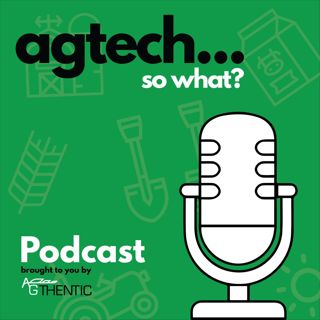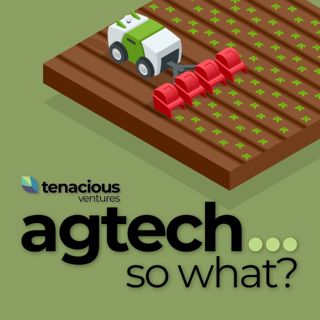
Why You Should Give a F*ck About Farming - Gabrielle Chan
Does the average citizen actually need to care about how their food is produced? This is the central question Australian author and journalist, Gabrielle Chan, set out to answer. Her latest book, “Why you should give a f*ck about farming” details her firm conclusion that, yes, if you eat food, you should in fact care about agriculture. While the old days of agriculture as the top contributor to GDP are over for most Western countries, Gabrielle argues the future of food and farming is becoming increasingly important for a raft of other reasons such as climate change and food security.In this episode, she talks about:Her own introduction to farming, including what shocked her when she first moved from the city to marry a farmer.The emergence of ‘food tribes’, where people view what they eat as part of their identity.How politics is failing agriculture by not having a “backyard plan,” a strategy to value natural capital and make considered decisions about land use.The role of agtech in bringing outsiders into agriculture, reinvigorating rural communities, and re-establishing connections between consumers and farmers.For more information and resources, visit our website
20 Okt 202139min

Farmers and Startups: Lessons and Tips for Collaborating
The divide between farmers and startups can seem like a chasm. Tech culture and agriculture have evolved from completely different backgrounds, and even seem to have their own languages. So how can agtech bring together two very different groups?In this episode, you’ll hear practical tips from farmers and agtech experts on how to build mutually beneficial relationships. For startups, this includes approaching farmers as partners, rather than ‘customers,’ and understanding ‘grower economics’. And for farmers, it’s about finding opportunities to access and help shape new products as the startup iterates. This might look like an equity partnership, an advisory relationship, or even becoming a co-founder.On the panel:Walt Duflock - Vice President of Innovation, Western GrowersEmma Weston - CEO & Co-Founder, AgriDigital Pete Nelson - President & Executive Director, AgLaunchThis episode is an edited version of an AusAgritech Meetup, sponsored by Foodbytes! by Rabobank. For more information and resources, visit our website.
6 Okt 202141min

Bonus: The Economics of Valuing Natural Capital - Ken Henry, former Treasury Secretary of Australia
Dr. Ken Henry became well-known in Australia for his bold economic reforms as the Treasury Secretary throughout the 2000s. His approach to conservation and agriculture is equally as bold, advocating for the natural environment to be valued, and even predicting “an explosion” in financial instruments to measure soil carbon, vegetation, biodiversity and other aspects of nature.As an economist, former Chair of the National Australia Bank, and current board director of Accounting for Nature, he brings a unique perspective to agtech and agriculture.In this bonus episode, Ken talks with Agthentic co-founder, Matthew Pryor, about:How his father’s career as a timber worker sparked an interest in measuring natural capitalWhy economic incentives are needed to further encourage landowners to protect the environmental condition of farms (and what these incentives should look like).How Australia (or any Western nation) can market itself as having quality, “climate adaptive” produce to capitalize on the growing middle classes in China and India.Why we can expect farm bank managers to be increasingly interested in how a farm’s environmental condition is managed.For more information, you can visit our website.
29 Sep 202139min

100th Episode Special: our most popular guests on soil carbon, regen ag, and the future of agtech
For our 100th episode (hooray!), we’ve brought back some of our most popular guests to check in on what’s changed in their businesses and in agtech since we spoke, and the new technologies and opportunities we can all be looking out for.These guests were popular for a reason:Mark Wootton - dubbed the ‘carbon neutral farmer,’ Mark is a pioneer in measuring natural capital… yet, he’s also highly skeptical of the regenerative agriculture movement.Stu Austin - manager of Wilmot Cattle Co, which recently secured a landmark deal to sell $500,000 worth of soil carbon credits to Microsoft.Sarah Mock - sometimes controversial, but always well-researched in her views, Sarah is an agricultural journalist and author, who just released a book examining what makes a ‘good farm’Derek Norman - VP of venture investment at Leaps by Bayer, Derek shares the latest on emerging technologies in agtech, including in fertilizer and soil carbon.This podcast also features insights on the future of agtech from YOU, our listeners! Thank you to all who sent in voice messages. For more information, visit our website.
22 Sep 202159min

Getting Off the Commodities Treadmill - Loran Steinlage
Loran Steinlage has been labeled a ‘regenerative’ farmer and branded a conservationist, yet as a farmer in Iowa, in many ways he’s far from the stereotypical image of either. He lives in the heart of the Iowa corn belt, but says he now doesn’t care whether he grows corn or not.In this episode, Loran shares how his drive for innovation has come from a series of difficult and life-changing events in his personal life. This, coupled with his love of tinkering with machines has helped him unlock new ways of farming, such as cover cropping, interseeding and relay cropping, that have not only won him awards and improved profitability, but also caught the attention of machinery manufacturers and helped him spend more time with his family.While other farmers in the area are focused on growing row crops at scale, Loran is focused on increased crop diversity, reducing the costs of production, and ultimately getting off the commodities treadmill.In this podcast, Loran talks about:How he’s able to grow a crop 365 days a year, even under snow.How modifying equipment has allowed him to reduce inputs and run a low cost production system.Why he hopes sharing his innovations will help other farmers consider alternative farming practices and different markets.For more information, visit our website.Also, we want to hear from YOU! We're planning our 100th episode and are looking for stories about how you have used any of the agtech or food innovation ideas discussed on this podcast in your business or workplace. Did it work? Or did it fail?You can record a short voice message by following the link on our website here, and you might just end up on the show!
8 Sep 202138min

Designing Crops to Change the Plant-Based Food System - Matt Crisp, Benson Hill
Benson Hill is designing crops and ingredients for some of the world’s most popular plant-based food brands. But the company has no intention of becoming a brand itself. Instead, it’s focused on revolutionizing the entire food system, from how plants are grown, to what they taste like, to the range of crop varieties on offer.Founder and CEO, Matt Crisp, started Benson Hill nearly a decade ago as a plant biology company, using analytics and machine learning to increase yields. Now it has grown to become a technology platform as well as a vertically integrated food and ingredients business, designing high protein soybeans and yellow peas to fuel the growing plant-based protein industry.In this episode, Matt shares:His journey from venture capital in the life sciences industry, to becoming an agtech startup founder.How the business model of Benson Hill has evolved and why it’s betting on the growth of the plant-based protein industry.How to involve farmers in testing crops and products on a commercial scale so growers benefit, as much as the company.Benson Hill’s recent SPAC deal and upcoming public listing on the New York Stock Exchange.For more information and resources, visit our website.Also, we want to hear from YOU! We’re planning our 100th episode and are looking for your stories about how you have used any of the agtech or food innovation ideas discussed on this podcast in your business or workplace. Did it work? Or did it fail?You can record a short voice message by following the link on our website here, and you might just end up on the show!
25 Aug 202140min

Bonus Episode: Did Silicon Valley Kill Agtech?
The Silicon Valley model for innovation has worked famously for many software based companies, such as Facebook and PayPal. However, when it comes to agtech, the Silicon Valley template for startup success hasn’t translated very well. This template, of either “user is the customer” or “user is the product” is rather limited in agriculture, where the farming population is small (restricting scale) and the stakes are high.This episode features Rob Trice, the founding partner of Better Food Ventures and The Mixing Bowl, along with Sarah Nolet and Matthew Pryor, who both lead the Agthentic Group and Tenacious Ventures. All three guests have a solid tech and business history in Silicon Valley and discuss why the business models typically used by venture-backed software companies, can’t just be copy-pasted to agriculture.They also dig into:The early days of Silicon Valley, the dot-com boom and bust and where Agtech 1.0 went wrong.How understanding the whole supply chain and embedded incentives , will be critical to success.How financing models from venture capital to SPACs can better fit with the agtech revolution (or evolution), as well as the positive signs for the future growth of the industry.For more information visit our website. You might also like our recent article: “How Silicon Valley Set Agtech Back a Decade”
18 Aug 202144min

Carbon neutrality and tackling misinformation in red meat - Jason Strong, Meat and Livestock Australia
Red meat is increasingly seen as the “bad guy” when it comes to climate change. Undoubtedly, animal agriculture has an impact on the environment, with 10 percent of Australia’s greenhouse gas emissions coming from livestock. But Australia's leading red meat marketing and R&D organization, Meat and Livestock Australia (MLA) says the negative environmental impacts from red meat are often overblown.While lamb and beef are still very popular in Australia, and cattle farmers are currently enjoying record prices, red meat consumption is becoming more contentious, and conversations about sustainable food and agriculture are increasingly susceptible to emotional debates and even misinformation.In this episode, MLA’s Managing Director, Jason Strong speaks about:The MLA’s commitment to become carbon neutral by 2030, and how the red meat industry plans to use technology and improvements in animal husbandry to achieve itThe battle between the Australian meat industry and the plant-based protein industry over the use of the word “meat” on labelsJason’s experience with groups that he claims are unfairly “denigrating” red meat as they push their own products and agendasWhy the MLA isn’t supportive of regulations to meet environmental targetsFor more information and links to resources mentioned in the podcast, visit our website
11 Aug 202142min






















